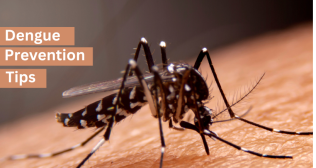
Alpha-Gal Syndrome: How a Tick Bite Can Trigger a Red Meat Allergy
Imagine enjoying a routine meal of the day; whether a steak, a hamburger, or even gelatin-containing dessert; only to experience hives, nausea, or worse right after a few hours later. For some, this isn't a coincidence, but a delayed reaction caused by a relatively unknown condition that is alpha-gal syndrome which is increasingly reported across various regions in the world. This immune response stems not from food intolerance but from a tick bite.
For the individuals looking for clarity on what is alpha gal, healthcare readers, and those with unexplained allergic reactions after eating red meat; This is your perfect guide to understand this condition that’s silently affecting thousands of people around the globe.
What Is Alpha-Gal Syndrome?
Alpha-gal syndrome is an allergy to red meat and other products made from mammals. It’s not caused by traditional allergen products like peanuts or shellfish but by a sugar molecule called galactose-α-1,3-galactose; commonly known as alpha-gal. This sugar is prominently found in most mammalian meats including beef, pork, lamb and venison, but not in poultry or fish.
But what makes this syndrome particularly unique is its trigger point: just a bite from the Lone Star tick (Amblyomma americanum). After being bitten by it, some people’s immune systems instantly develop an aggressive response to alpha-gal.
And what’s the result of it? A drastic delayed allergic reaction sometimes happens in a period of 3-6 hours after consuming any sort of red meat.
While Alpha-gal isn’t infectious, but it can dramatically disturb one’s lifestyle. Reactions range from mild discomfort to life-threatening anaphylaxis (potentially threatening allergic reaction). Unlike many food allergies that occur instantly, the delay in symptoms can make diagnosis a challenge.
Given that it involves both: immunology and environmental exposure, understanding what alpha gal is actually. This condition underscores the surprising ways by which our immune systems can be influenced by external environmental factors like parasites.
How a Tick Bite Triggers This Allergy
The Lone Star tick is pre-dominant to this syndrome. Known to the southeastern United States but expanding in range, this particular tick transmits alpha gal into the human bloodstream during feeding. But the cache is; this tick doesn’t produce alpha-gal; it merely carries forward it from previous animal hosts, like deer or cows.
Here’s how the issue begins:
- Initially, a tick bites a person, transmitting alpha-gal molecules through its saliva.
- Then, the human immune system begins producing IgE antibodies.
- After that when the person eats red meat, these antibodies react to the alpha-gal present in the food which suddenly triggers allergic symptoms.
It’s not just red meat that’s always problematic. Some sorts of vaccines, gelatin-based products, and even certain medications (like those made from animal by-products) can also contain alpha-gal and this makes the condition more complicated than just a simple “meat allergy.”
This development is particularly alarming because many people may not associate a past tick bite with a food reaction that happens months later. And since alpha-gal allergy can hit at any age. In response to that; prior tolerance to red meat doesn’t guarantee future immunity.
Symptoms of Alpha-Gal Syndrome
The most unclear feature of alpha-gal syndrome symptoms is the delay; often 3 to 6 hours post-consumption of red meat. This latency differentiates it from the most common food allergies and more often leads to mis-diagnosis.
These are the primary symptoms of alpha gal:
- Hives or itchy rash.
- Severe Swelling in mouth, lips or throat.
- Shortness of breath.
- Drop in blood pressure.
- Anaphylaxis (in severe cases).
- Problems such as severe stomach cramps, diarrhea or even nausea.
What makes this condition even worse is how unpredictable these reactions can be, including both confusion and stress when trying to manage it.
Another tricky situation to this is that symptoms don’t always appear every time when red meat is eaten. Several factors can influence the body’s response such as how meat was consumed or taken, whether it was processed or not or what other foods were eaten along with that.
Understanding Treatment and Management Strategies
At present, there is no cure for it. alpha-gal syndrome’s treatment revolves around prevention and symptom avoidance at the moment.
1. Strict Avoidance of Mammalian Products
The core-foundation of alpha-gal syndrome treatment is dietary adjustment. Avoid all types of mammalian meats such as beef, pork, lamb, venison and start check for hidden animal-derived ingredients in:
- Gelatin (often found in candies and marshmallows).
- Certain dairy products.
- Capsules or medications with animal-based coatings on them.
Always Remember that; Vegetarian and vegan alternatives become essential, but label reading is non-negotiable.
2. Medical Guidance and Regular Testing
Ongoing consultation with an allergist is very essential. Periodic IgE testing for alpha-gal antibodies can really help in monitoring progress. In some cases, antibody levels decline over time, particularly if tick bites are avoided at the moment.
3. Tick Bite Prevention
We’ve always been taught that Preventions have always been the key. Use insect repellents/sprays, wear long clothing in wooded areas, and check for ticks after any outdoor activities.
While the alpha-gal allergy may improve after some time with tick avoidance but recovery can take years and some people may remain allergic permanently.
Long-Term Outlook and Prevention
The long-term outcome can vary from person to person. In so many cases, antibody levels start declining after 1 to 3 years of strict avoidance of red meat and ticks. However, re-experiencing tick bites can stimulate sensitivity; even if symptoms have disappeared.
Here’s what to keep in mind:
- Regular follow-ups with an allergist are important.
- Always stay updated on changing formulations and food labels.
- Avoiding presence at wooded or grassy areas, especially in tick prone zones can help in prevention.
While there’s research ongoing into vaccines or behavioral therapies, none are currently available. But for now, preventing tick bites remains the most effective precaution.
Alpha-gal syndrome is quite manageable with prompt awareness and action, opening the door to conscious eating instead of ending your food enjoyment at all.
FAQs
Q1. Is alpha-gal syndrome permanent?
Ans. Not necessarily but some individuals recover over a period of time if re-bitten by ticks. Others may remain sensitive in the long-term.
Q2. Can I eat chicken or fish?
Ans. Yes. Poultry and seafood do not contain any sort of alpha-gal and are typically considered safe.
Q3. How is alpha gal diagnosed?
Ans. Blood tests measuring IgE antibodies to alpha-gal can confirm the diagnosis. A food challenge may also be done under medical supervision of the doctors.
Q4. Is this condition rare?
Ans. It’s considered majorly un-reported but not rare. Awareness is growing as more cases emerge across the U.S., Australia, and Europe.
Q5. Can kids get alpha-gal syndrome?
Ans. Though this is more common in adults, but yes; children bitten by ticks can also develop the allergy in them.
Conclusion
Alpha-gal syndrome is a prime example of how unexpectedly nature and food can affect our health. A single tick bite can forever change how our body reacts with food.
If you’ve had delayed allergic reactions in the past or you’ve been experiencing any strange symptoms after eating red meat, then consult your doctor promptly about alpha-gal syndrome symptoms.
Stay alert in tick prone areas, monitor your diet closely and maintain a proper structure for it, and don’t just ignore the signs. Your immune system could already be sounding the alarm for better health.



















